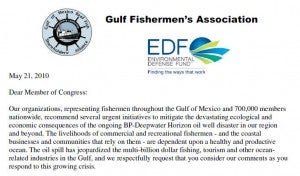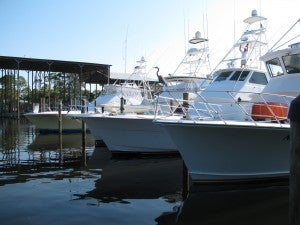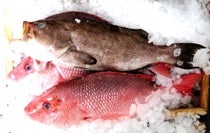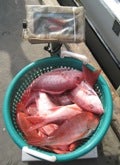As the BP-Deepwater Horizon Oil Well Disaster continues to spill massive amounts of oil into the ocean—jeopardizing the multi-billion dollar fishing, tourism and other ocean-related industries in the Gulf—EDF is partnering with Gulf fishing organizations to recommend several urgent initiatives to mitigate the devastating ecological and economic consequences for the Gulf region and beyond.
The Gulf of Mexico Reef Fish Shareholders’ Alliance and the Gulf Fishermen’s Association joined us in signing a letter that is being distributed today to Congress and the President to provide guidance for responding to the growing crisis.
In the letter, we advocate for at least $100 million in funding for direct assistance to adversely affected commercial and recreational fishermen and fishing communities, to improve fisheries science, and to make fisheries more resilient to harm caused by human activities.
First and foremost, we urge BP and its business partners, Congress, and the Administration to ensure that all possible means are applied to regain control of the oil well, ensure that the dispersants used are the safest and most effective available, and that damages are cleaned-up as quickly as possible.
Once the spill is stopped, the short- and long-term measures below are needed to begin the long process of helping ocean resources and coastal communities recover.
Short-term: Institute a fishing community recovery program.
- LOSS RECOVERY: Help commercial and recreational fishermen and fishing-related businesses recover lost income including commercial fishing operations, seafood dealers and retailers, charter vessels and guides, bait and tackle shops, marinas, and others harmed.
- SEAFOOD SAFETY: Help the commercial and charter boat fishing industries implement seafood and catch traceability and verification systems to ensure that commercial fishermen and charter vessels harvest fish from waters declared safe and healthy by federal regulators.
- PUBLIC INFORMATION: Assist the commercial and recreational fishing industries to rebuild business by providing assistance to develop a public information and media campaign to highlight the real, versus perceived, impacts of catching and consuming Gulf fish to ensure consumer confidence.
- FISHERIES BASELINE INFORMATION: Accelerate stock assessment and data collection efforts for commercial and recreational fisheries to expand and enhance baseline data on the present status of key fisheries affected by the oil spill.
Long-term: Increase fishery and community resilience through better science and management.
- SCIENCE AND DATA: Improve science and data collection for commercial and recreational fisheries by providing significant additional funding to measure the long-term impact of the oil spill on fish stocks and track the pace of their recovery, and engage fishing vessels in research that contributes to better fishery science and enhanced seafood safety.
- FISHERY MANAGEMENT: Increase fishing business resilience to natural and manmade disasters by accelerating fishery management reforms that achieve compliance with fishery management goals.
Never miss a post! Subscribe to EDFish via a email or a feed reader.












 On Jan. 1, 18 Gulf of Mexico commercially-caught grouper and tilefish species were added to the region’s individual fishing quota (IFQ) program, a type of catch share. This newly expanded program is a big conservation victory. Now, 19 valuable Gulf fisheries are being managed under a tool proven to rebuild struggling fish stocks.
On Jan. 1, 18 Gulf of Mexico commercially-caught grouper and tilefish species were added to the region’s individual fishing quota (IFQ) program, a type of catch share. This newly expanded program is a big conservation victory. Now, 19 valuable Gulf fisheries are being managed under a tool proven to rebuild struggling fish stocks. The National Oceanic and Atmospheric Administration’s (NOAA) new catch share policy, which encourages the use of catch shares to manage fisheries, is exciting news for the Gulf of Mexico’s declining fisheries and struggling fishermen.
The National Oceanic and Atmospheric Administration’s (NOAA) new catch share policy, which encourages the use of catch shares to manage fisheries, is exciting news for the Gulf of Mexico’s declining fisheries and struggling fishermen.